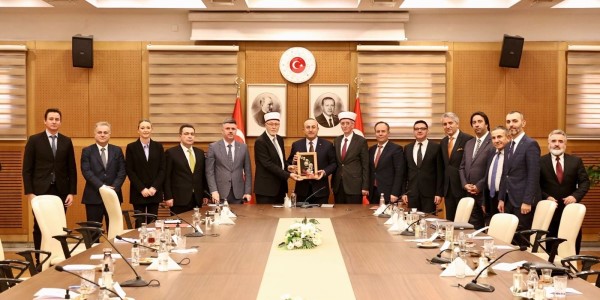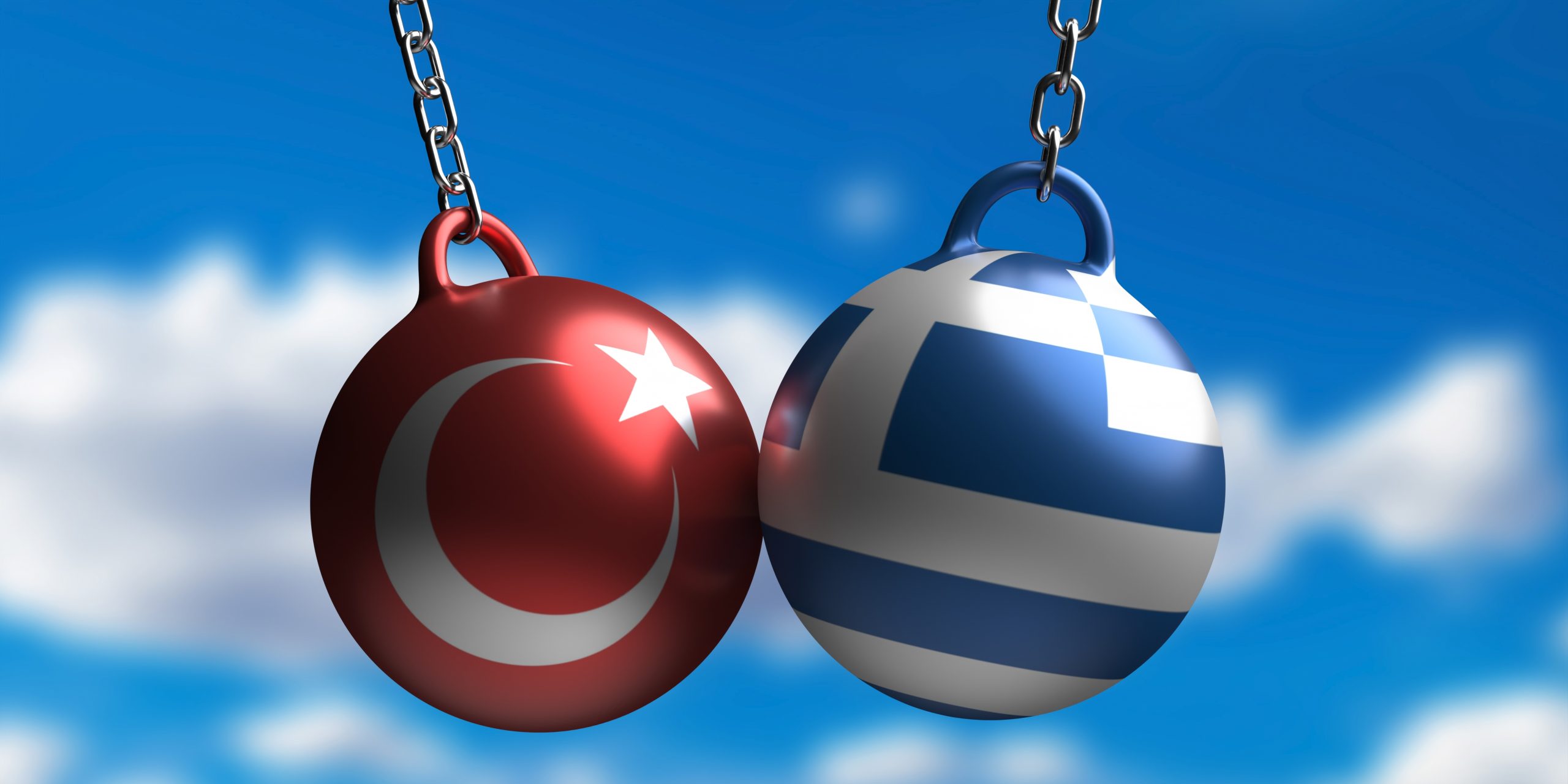In a speech at the UN General Assembly in September, Türkiye’s Islamist strongman, President Recep Tayyip Erdoğan, called for an end to “Greece’s discriminatory and repressive policies that violate legal obligations towards the Turkish minority of Western Thrace.”
They are hypocrites. They pretend to be pious Muslims when they get funds from Turkey to promote Islam in Western Thrace.
An anonymous Turk speaking about diaspora leaders in Thrace.
“We invite the international community to end the persecution of the Turkish Cypriots and to officially recognize the Turkish Republic of Northern Cyprus as soon as possible,” Erdoğan said, drawing, as he has done countless times, parallels between the Turkish minority communities in Greece and Cyprus.
In November, Erdoğan met with the Secretary General of the Organization of Islamic Cooperation (OIC), H.E. Hissein Brahim Taha, in Istanbul on the sidelines of the 38th Session of the OIC Standing Committee for Economic and Commercial Cooperation (COMCEC). Erdogan emphasized the need to “continue addressing the just causes of Muslim communities around the world including the Turkish Cypriots, Rohingya, Uighurs, Kashmiris as well as the Turkish Muslim Minority in Western Thrace.”
This was vintage Erdoğan: a pragmatic blend of his Islamist-self — behaving as the savior of all oppressed Muslims around the world — and his survivor-self, fishing for more conservative and nationalist votes ahead of critical presidential and parliamentary elections in May. He knows that the OIC member states will read his speech and throw it in the bin, but his voting base in Türkiye will eat this stuff up. His earlier calls to the Muslim world for the recognition of the breakaway Turkish statelet in northern Cyprus, TRNC, have been ignored by fellow Muslims: Turkey is the only country in the world that recognizes the TRNC.
It is not yet clear if the earthquake that has now devastated southwest Turkey will lead to a change of focus for the Turkish president. But in recent months, Erdoğan’s adventurism in what the Greeks call Thrace (Thraki — Θρᾴκη in ancient Greek) and which Turks call Western Thrace (Batı Trakya) has been in full swing.
This region lies just across the border with Turkey. It reaches the Karasu (Nestos) River to the east, with the district of İskeçe (Xanthi in Greek) lying at the western end of the region. In the course of its history, Thrace was ruled by the Byzantines, then the Ottomans, and for a few years before World War I, by the Bulgarians. Since the end of World War I, Thrace has been sovereign Greek territory. Given this history, it comes as no surprise that the territory has witnessed numerous expulsions.
Today, the region is home to multi-ethnic Muslim communities of Turks, Pomaks and Roma, which today form an estimated 120,000 people, 32 percent of the local population, or just less than one percent of the entire Greek population. In Xanthi, one of Thrace’s larger cities, Muslims account for 43 percent of the population.
While inter-group relations are peaceful in Thrace, Turkish community leaders in the territory often complain of violations of their minority rights under the Treaty of Lausanne signed in 1923 to bring an end to ethnic strife in the region. According to Ozan Ahmetoğlu, head of the Turkish Union of Xanthi, the number of (Turkish) minority primary schools has dropped to 99 from 231 some 27 years ago. The Greek government cites regulations that schools with less than nine pupils cannot be sustained. Athens is planning to close down four more Turkish schools in 2023. Predictably, Erdoğan has used these closures as a pretext for mischief.
Turkish Foreign Ministry Spokesman Tanju Bilgiç said that that decision was a reflection of systematic violations of minority rights. In January, Friendship, Equality and Peace Party, a pro-Turkish political grouping in Thrace, sent a letter to the United Nations to complain of systematic rights violations. In December, Mustafa Trampa, a mufti in Xanthi, accused Greek authorities of planning to convert a Muslim cemetery into a football pitch.
Some of the Turkish claims may look justified. But there is a lot of nonsense, intended to attract praise — and money — from Ankara. The Western Thrace Turkish Federation of Europe, for instance, claimed that Greek Prime Minister Kyriakos Mitsotakis’ January visit to Western Thrace was tantamount to the denial of the existence of the Turkish minority. Since when is a prime minister prohibited from visiting the outlying sections of the country he governs? Predictably, pro-Turkish activists have invoked religious identity to fuel the hysteria. Hasan Küçük, head of the Association for the Solidarity of Western Thrace Turks, said that “religious autonomy is indispensable for this community.”
But the Turks I’ve spoken to in the territory have no use for such mischief. “We are enjoying our lives here (in Western Thrace),” said a young man from the Turkish community with a broad smile. “I wish I could tell you more about what’s going on here. Most of our people’s noise is aimed at winning hearts and minds in Ankara – and money. They are good ouzo drinkers who pretend to be pious Muslims.”
So adherents of Ankara-backed Turkish nationalism in Greece appear to be stoking feelings of grievance as a tool to obtain money from the Erdoğan regime – to the dismay of their fellow Turks in the region. “They are hypocrites,” a local Turk told me. “They pretend to be pious Muslims when they get funds from Turkey to promote Islam in Western Thrace. I am happy to see that they spend it on ouzo at the local kafeneion, though secretly.”
Such testimony rings true. Turks actively participate in all aspects of everyday public, civil and political life. There are numerous Turkish NGOs operating in Greece without interference — just as they do in the rest of Europe. In successive parliamentary elections since 1927, members of the Turkish minority in Thrace have been elected as MPs. Currently there are three minority MPs in the Greek parliament. And the school closures that have been used as a pretext to delegitimize Greek policy in the region are the result of a decline in the number of students attending the schools. This decline is due to a lack of interest on the part of Turkish families — not Greek oppression.
There are numerous Quranic institutions, and more than 240 mosques operating in the region, which has the highest rate of mosques per citizen of Islamic faith in Europe. But most importantly, the Turks in Thrace are happy to be European Union citizens. They have no desire to immigrate to non-EU, autocratic Turkey under an Islamist regime.
Nevertheless, under Türkiye’s neo-Ottoman revisionist policy calculus, Western Thrace must be under Turkish control, like other former Ottoman lands in the Balkans, Arabia and the Caucasus. What to do? Erdoğan has struggled hard in the past decade to “re-Ottomanize” former Ottoman lands, hoping that Sunni Islamism would work as the miracle “glue.” It has not. Erdoğan’s ambitions over Syria (jihadists), Egypt (Muslim Brothers), and Israel (Hamas) have all failed. He is now in the process of mending fences with all of the countries he politically declared war on: Israel, Egypt, Syria, the United Arab Emirates and Saudi Arabia.

But ambitions are ambitions. Ideologies are too hard to abandon in the face of embarrassing defeat and Erdoğan’s mischief continues. In December, Turkish Foreign Minister Mevlüt Çavuşoğlu received a delegation from the Advisory Board of the Western Thrace Turkish Minority.
At this meeting Minister Çavuşoğlu is seen on both sides with two Turkish imams, local religious leaders in Thrace. Turkish strategic interest in Western Thrace is not just ethnic or neo-Ottoman, but also religious.
Is the Greek government excessively alarmed by the Turkish export of sharia? Probably not.
“It is less threatening to Greece if Turkey exported sharia to Greece than ethnic nationalism,” wrote Baskın Oran, a prominent Turkish academic and columnist at the Istanbul-based Armenian newspaper Agos.
The Turkish mind (in Western Thrace) is confused too, Oran says. “They want to preserve their autonomy brought on religious lines by the 1913 and 1923 treaties. And they want to keep (Muslim) Turks, Pomaks and Roma in Muslim identity,” Oran wrote in Agos. “Ironically, the sparring neighbors of the Aegean Sea seem to be living in a symbiosis in Western Thrace.”
Oran noted that Turkey is not just exporting sharia to Western Thrace. “It is exporting sharia through elected muftis and the Advisory Board of the Western Thrace Turkish Minority which muftis chair.”
According to Oran, muftis and the Advisory Board have taken all community life under their control. (Minority) NGOs have been banned from making public statements. Anyone who expresses an opinion in contradiction with the Turkish Consulate would be “punished.” Turkish minority students who study at Turkish universities on scholarship may lose their grants. Ziraat, a Turkish state lender with a branch office in Western Thrace, makes it impossible for the “dissident Turks” to borrow loans. Many locals have been alienated from the community after imams labelled them “traitors and infidels.”
Erdoğan’s efforts to disrupt this symbiosis in Thrace may soon come to an end, however. With the catastrophic February 6 earthquake that has killed more than 35,000 people and injured over 100,000, Türkiye’s Islamist strongman has other work to attend to. In particular, he needs to win the most critical presidential and parliamentary election in Turkey’s modern history. It is scheduled to take place on May 14, but may be postponed because of the disaster.
Burak Bekdil is an Ankara-based political analyst and a fellow at the Middle East Forum.
